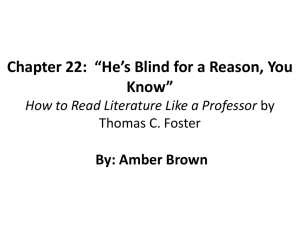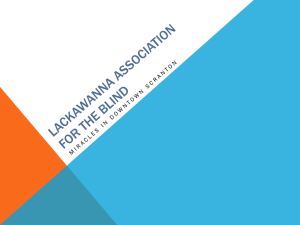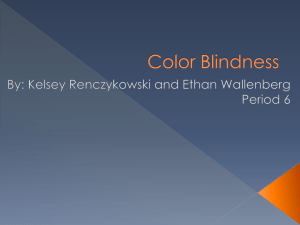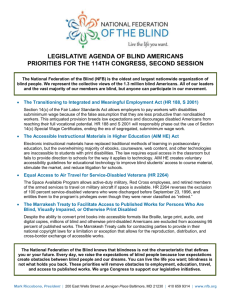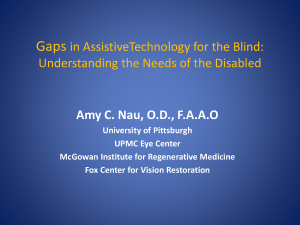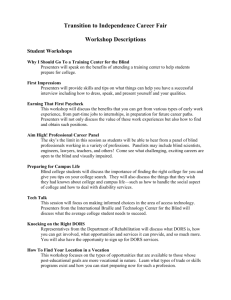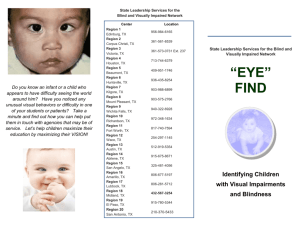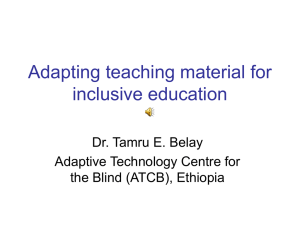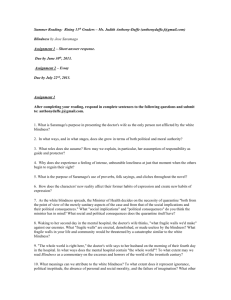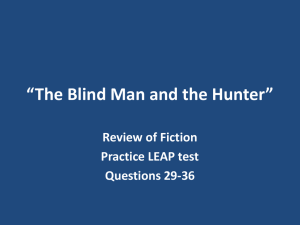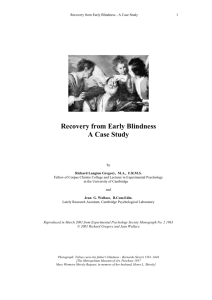Course Description - Community Rehabilitation and Disability Studies
advertisement
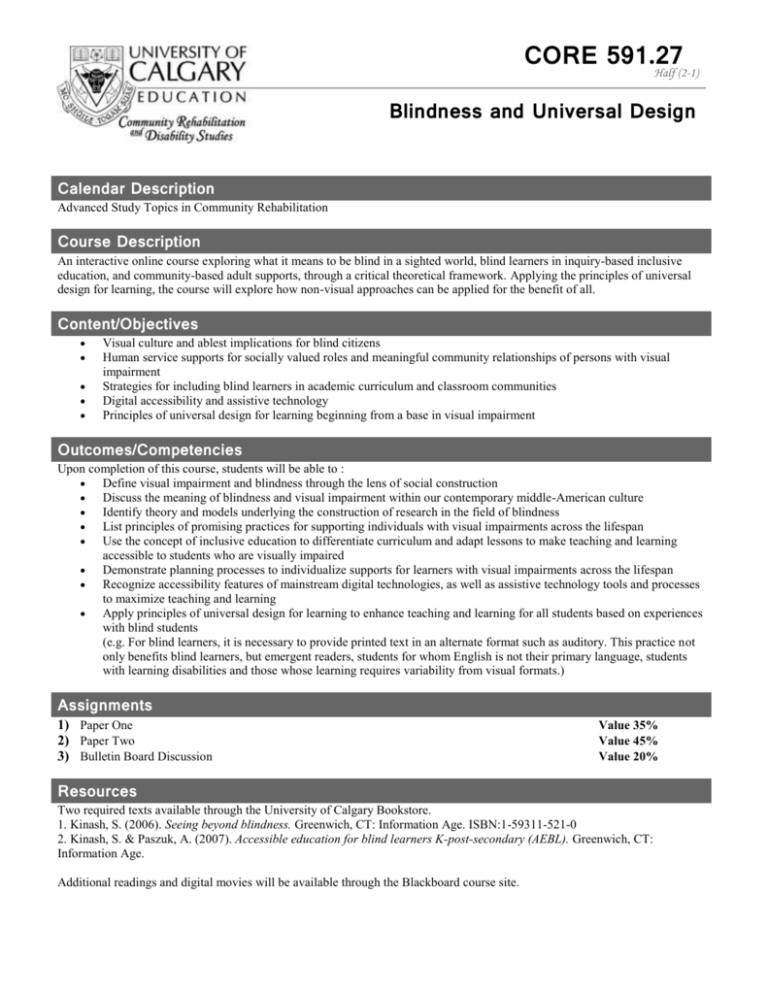
CORE 591.27 Half (2-1) Blindness and Universal Design Calendar Description Advanced Study Topics in Community Rehabilitation Course Description An interactive online course exploring what it means to be blind in a sighted world, blind learners in inquiry-based inclusive education, and community-based adult supports, through a critical theoretical framework. Applying the principles of universal design for learning, the course will explore how non-visual approaches can be applied for the benefit of all. Content/Objectives Visual culture and ablest implications for blind citizens Human service supports for socially valued roles and meaningful community relationships of persons with visual impairment Strategies for including blind learners in academic curriculum and classroom communities Digital accessibility and assistive technology Principles of universal design for learning beginning from a base in visual impairment Outcomes/Competencies Upon completion of this course, students will be able to : Define visual impairment and blindness through the lens of social construction Discuss the meaning of blindness and visual impairment within our contemporary middle-American culture Identify theory and models underlying the construction of research in the field of blindness List principles of promising practices for supporting individuals with visual impairments across the lifespan Use the concept of inclusive education to differentiate curriculum and adapt lessons to make teaching and learning accessible to students who are visually impaired Demonstrate planning processes to individualize supports for learners with visual impairments across the lifespan Recognize accessibility features of mainstream digital technologies, as well as assistive technology tools and processes to maximize teaching and learning Apply principles of universal design for learning to enhance teaching and learning for all students based on experiences with blind students (e.g. For blind learners, it is necessary to provide printed text in an alternate format such as auditory. This practice not only benefits blind learners, but emergent readers, students for whom English is not their primary language, students with learning disabilities and those whose learning requires variability from visual formats.) Assignments 1) Paper One 2) Paper Two 3) Bulletin Board Discussion Value 35% Value 45% Value 20% Resources Two required texts available through the University of Calgary Bookstore. 1. Kinash, S. (2006). Seeing beyond blindness. Greenwich, CT: Information Age. ISBN:1-59311-521-0 2. Kinash, S. & Paszuk, A. (2007). Accessible education for blind learners K-post-secondary (AEBL). Greenwich, CT: Information Age. Additional readings and digital movies will be available through the Blackboard course site. Details for current course offerings are available at: www.crds.org 3 Instructor and Course Information COURSE: CORE 591.27 INSTRUCTOR: Dr. Shelley Kinash TERM: Summer, 2007 TELEPHONE: (403) 220-3679 FAX: (403) 282-8479 OFFICE: EdT 602L SECTION: L/B 61 E-MAIL: kinash@ucalgary.ca FORMAT: Online Course Access This CRDS course is being offered through Blackboard. The Internet address for Blackboard is http://blackboard.ucalgary.ca All students are required to apply for University of Calgary email address. Your username and password for course access are the same as those used for your email. Details of Assignments Assignments must be received by the course outline due-date. Late assignments will not be accepted due to the short time span of the summer session. They may be submitted via email as an attachment to the instructor’s email address or through the Blackboard assignment drop box. Paper One is Due on or before July 22, 2007. Please respond to one of the three following topics. 35% Choices: a. Use popular media to launch an inquiry into the social context of blindness. Begin your exploration by reading, Connor, D.J. & Bejoian, L.M. (2006). Pigs, pirates, and pills: Using film to teach the social context of disability. Teaching Exceptional Children, Nov/Dec., 52-60. This paper annotates selected resources exploring disability in a social context. Discuss the social construction of blindness and the implications for your field of practice. In other words, what are the unconscious beliefs in our culture that determine our attitudes about being blind? What are the consequences of these mindsets on the way in which blind people are treated in community? For example, if you are a teacher, consider the accessibility of schools and whether or not blind learners are academically and socially included in the school context; what are the underlying cultural beliefs? b. Interview (a) parent(s) of a child who is congenitally blind regarding the child’s development. Compare and contrast the parent (s) perceptions and experiences with the descriptions in the literature. Discuss, analyze the parent(s)’ theoretical constructions on development in the matrix of blindness. What do you perceive as some of the influential factors shaping the perceptions? c. Interview an adult who is blind with respect to what it means to be blind, perceptions regarding received supports, and his/her decision whether or not to become affiliated with the organized blind. Compare and contrast the interview response with that presented in the literature. Paper Two is Due on or before August 13, 2007. Please respond to one of the three following topics. 45% Choices: a. Choose a graduate level thesis (masters or PHD) from the field of blindness. Briefly present the research (questions, sample, method, results, conclusions). Analyze the research through a critical stance. Ask questions to the research such as: what was the author’s underlying stance regarding blindness; what was the researcher’s rationale for applying quantitative, qualitative or mixed methodology; what matters about this research; to what extent were blind people involved in the research, and in what role; what are the practice implications. Position this research within the larger body of research literature in the field of blindness. 2 b. Prepare an Individualized Program Plan for a blind learner who is in an inclusive classroom at any level of education from kindergarten through post-secondary. Prepare an accompanying lesson plan for the inclusive classroom (of which the blind learner is a member) with an inquiry-based stance on education. Submit an accompanying paper that uses peerreviewed literature to support your decisions underlying the IPP and lesson plan. Within your paper, apply the principles of universal design. c. Select a technology that has demonstrated potential for enhancing learning for students with visual impairments. Creatively present application of this technology for both the visually impaired learner and others. Reference the literature on universal design. Criteria for Papers Papers are to be 8-10 pages (double-spaced with 12-pt. font) in length. Alternate assignment presentation formats will be accepted provided that the student has had the idea approved by the instructor in advance. Examples of creative alternatives to paper-based presentation include audio-tapes, digital movies, and websites. All assignments must reference peer-reviewed literature beyond those provided within the course. The papers will be graded based on: An orienting introduction, developed body, and synthesizing conclusion; A clean, tight, well-informed thesis, or in other words, central point; Free from grammatical errors, typos, or other mechanical problems. In other words, a pleasure to read without distraction. Well-chosen peer-reviewed literature integrated in the paper (both current and seminal pieces). You have read and presented the literature with a critical perspective. You have used primary sources only. Both your in-text and endtext referencing is in compliance with the APA style manual. Your own creative ideas and reflections (your own voice) are evident throughout The writing is tight. The paper started out as a larger paper and was edited and refined and all ‘extra’ removed so that only the core remains Your paper demonstrates an appreciation of and understanding of theory “There’s nothing so practical as a good theory” Your paper interweaves between theory and practice. You demonstrate how the theory informs the life of people with disabling conditions and/ or the practice of community rehabilitation, teaching, or psychology and how such practice informs the theory. Bulletin Board Discussion 20% Students are expected to post a minimum of two entries in response to each instructor-posted question throughout the course term. The bulletin board postings will be graded based on: Demonstration of reflection and critical thinking; Assimilation of text, book of readings, course lectures and other course materials; Critical analysis guided by the questions above; Application to practical work in teaching, psychology, nursing, or community rehabilitation; Thematic correspondence and dialogue with questions and preceding entries of student colleagues. Students are invited to discuss their paper choice with Dr. Kinash early in the semester so that she may advise and recommend resources. 3 Marking Scheme 95 – 100 90 – 94 85 – 89 A+ A A- 80 – 84 75 – 79 70 – 74 65 – 69 60 – 64 55 – 59 B+ B B- C+ C C- 50 – 54 45 – 49 Below 44 D+ D F NOTE: The last day to change/register and pay balance of fees for the Summer session is July 5, 2007. The last day to withdraw is August 15, 2007 All assignments will be held at the Community Rehabilitation and Disability Studies office for only one (1) year after the last day of term. Academic Accommodation Students with a disability, who require academic accommodation, need to register with the Disability Resource Centre http://www.ucalgary.ca/UofC/Others/DRC MC 295, telephone 220-8237. Academic accommodation letters need to be provided to course instructors no later than fourteen (14) days after the first day of class. It is a student's responsibility to register with the Disability Resource Centre and to request academic accommodation, if required. IMPORTANT: Intellectual honesty is the cornerstone of the development and acquisition of knowledge and requires that the contribution of others be acknowledged. Consequently, plagiarism or cheating on any assignment is regarded as an extremely serious academic offence. Students should examine sections of the University Calendar that present a Statement of Intellectual Honesty and definitions and penalties associated with Plagiarism/Cheating/and Other Academic Misconduct. Purchasing a Textbook from the University of Calgary Bookstore: Shop On-line www.calgarybookstore.ca/ Click on --> Shop On-line; Click on --> Textbooks; Follow the directions. Order by Phone: (403) 220-5937; Toll Free: 1-877-220-5937 In Person: Go to the University of Calgary Bookstore, MacEwan Student Centre, Room 155, 2500 University Drive NW, Calgary, AB T2N 1N4 4
